A Gendered Organizational Analysis of the ... - Campus Activism
A Gendered Organizational Analysis of the ... - Campus Activism
A Gendered Organizational Analysis of the ... - Campus Activism
Create successful ePaper yourself
Turn your PDF publications into a flip-book with our unique Google optimized e-Paper software.
organization whose leadership would have an identical gender breakdown as its membership, ra<strong>the</strong>r than<br />
compared to mainstream organizations whose inequality is much worse. SEAC might have a majority <strong>of</strong> women<br />
in leadership and still have ‘gender inequality’ relative to its membership base and <strong>the</strong> standard to which SEAC<br />
would hold itself.<br />
<strong>Gendered</strong> Organization Theory<br />
In her two articles, Acker (1990 & 1992) sets out a <strong>the</strong>ory <strong>of</strong> gendered organizations which builds <strong>of</strong>f<br />
recent feminist work in an area previously untouched by feminist scholarship. The <strong>the</strong>ory starts with <strong>the</strong> fairly<br />
obvious observation that men control most organizations by dominating <strong>the</strong>ir top positions (1990, 139). Acker<br />
recognized that this male dominance, while obvious to modern feminists, had been traditionally ignored by<br />
sociologists who <strong>the</strong>orized organizations as being gender-neutral and asexual (1990, 140). She hypo<strong>the</strong>sizes that<br />
feminists may have been reluctant to make inroads into organizational <strong>the</strong>ory because <strong>the</strong>y were embarrassed or<br />
confused by <strong>the</strong> failure <strong>of</strong> <strong>the</strong> collectivist alternative organizations that had generally evolved into more<br />
traditional hierarchies over time (1990, 141).<br />
Countering traditional assumptions that gender should be absent from organizational analysis, Acker<br />
asserts <strong>the</strong> importance <strong>of</strong> organizations in <strong>the</strong> reproduction <strong>of</strong> <strong>the</strong> distinction between ‘paid and unpaid work’,<br />
reproduction <strong>of</strong> ‘income and status inequality’, transmission <strong>of</strong> gender stereotypes, and <strong>the</strong>ir effect on individual<br />
action and behavior (1990, 141). In addition feminists should be interested in creating and maintaining feminist<br />
organizations, and this requires a <strong>the</strong>ory <strong>of</strong> organizations (1990, 141). Acker privileges <strong>the</strong> position <strong>of</strong> feminist<br />
<strong>the</strong>oreticians over that <strong>of</strong> male ones, arguing that women are better able to analyze <strong>the</strong> gendering <strong>of</strong> organizations<br />
due to <strong>the</strong> gender oppression <strong>the</strong>y face (1992, 249).<br />
Acker explains <strong>the</strong> intent <strong>of</strong> herself and o<strong>the</strong>rs in critiquing traditional <strong>the</strong>ory:<br />
The authors <strong>of</strong> <strong>the</strong>se critiques are responding to and helping to create <strong>the</strong> conditions for a<br />
fundamental reworking <strong>of</strong> organizational <strong>the</strong>ories to account for <strong>the</strong> persistence <strong>of</strong> male<br />
advantage in male organizations and to lay a base for new critical and gendered <strong>the</strong>ories <strong>of</strong><br />
organizations that can better answer questions about how we humans come to organize our<br />
activities as we do in contemporary societies (1992, 248).<br />
Acker calls for a new perspective that would analyze how “...advantage and disadvantage, exploitation<br />
and control, action and emotion, meaning and identity, are patterned through and in terms <strong>of</strong> a distinction<br />
2



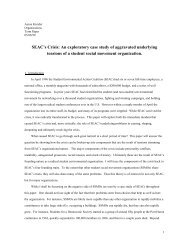
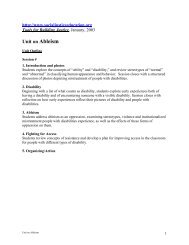
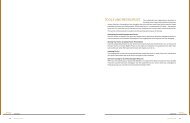
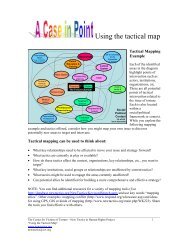
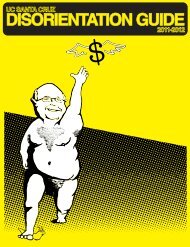

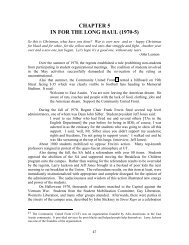



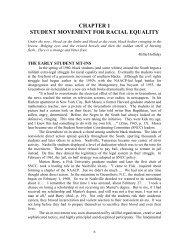
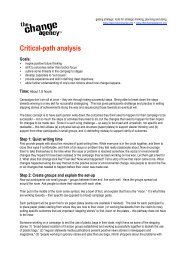
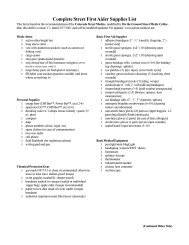
![Meaningful Student Involvement Research Guide [pdf] - SoundOut](https://img.yumpu.com/38822556/1/190x231/meaningful-student-involvement-research-guide-pdf-soundout.jpg?quality=85)